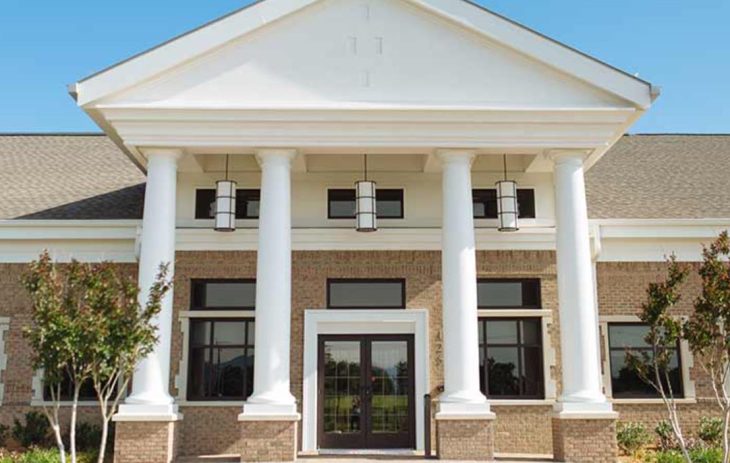About Mount Regis Center
Located in Salem, Virginia, Mount Regis Center is a substance use and mental health disorder treatment center. They have residential, partial hospitalization, and intensive outpatient programs. They also have a detox program. The programs are for adults 18 and older. One of the nice things about this center is that they take insurance from most of the major companies, although they don’t accept Medicare.
They’re also part of the Veterans Administration’s Community Care Network (CCN). The CCN helps Veterans with easier access to health services, including behavioral health and substance treatment.
You’ll spend your recovery in a historic estate with 68 beds. The hardwood floor gives a natural touch to complement the modern furniture and clinical medical equipment. They’re main clients are from folks in the surrounding neighborhoods, so you’ll be with your peers in a comfortable, familiar setting. There are plenty of open spaces to socialize, play games, and simply talk.
Detox is an inpatient medical detoxification program. If you haven’t been able to quit drugs or alcohol on your own, you probably need detox. When you’ve been taking substances for a long time, your body becomes physically dependent on them. It’s tough to quit on your own and, in some cases, quitting abruptly on your own is dangerous.
Detox helps you quit safely. In the detox program, you’ll be monitored by a team of professionals, including doctors, registered nurses (RNs), physician assistants, and other licensed professionals. If necessary, you’ll be given medications to help ease your withdrawal symptoms. Everyone’s detox is different but some common alcohol withdrawal symptoms include insomnia and nausea.
While you’re in the detox process, you may also have therapy. If you and your team decide therapy is a good option, you’ll participate in group therapy. One of the benefits of group therapy is introducing you to the 12 Step model of recovery. The 12 Step model includes programs like Alcoholics Anonymous (AA) and Narcotics Anonymous (NA). Group therapy helps build a foundation for your recovery. You’ll find support and also inspire others on the recovery journey.
After finishing detox, which takes about 5-7 days, you’ll meet with your treatment team to discuss your next steps. You may opt for further inpatient care or transition to a partial hospitalization program (PHP) or intensive outpatient program. You’ll leave the detox program with a discharge plan so you can be confident about your recovery.
Levels of Care
-
Inpatient
Inpatient and residential programs provide round-the-clock medical and emotional support as you live at the treatment facility. This level of care may be recommended if you have severe addictions or mental health conditions since it removes outside distractions and allows you to focus solely on therapy.
-
PHP
Partial hospitalization programs provide comprehensive treatment in a structured setting during the day but allow you to return home at night. These programs offer a balance of inpatient and outpatient rehab and provide intensive support without full time residency.
-
Outpatient
In outpatient therapy, you’ll attend therapy sessions several times each week while living at home. This is ideal if you have a strong support system and a lower risk of relapse. Outpatient treatment offers flexibility to maintain work, school or family obligations.
-
Dual Diagnosis
Dual diagnosis programs address substance use disorders and co-occurring mental health conditions simultaneously. This integrated approach to care improves the likelihood of long term recovery and stability by addressing the root causes of addiction.
Detox Service Setting
-
Inpatient Detox
Inpatient detox occurs in a dedicated treatment facility. You’ll live there around the clock and receive intensive medical support and supervision to help manage your withdrawal symptoms. It is suitable for individuals with moderate to severe addictions as it ensures a stable detox environment.
-
Outpatient Detox
Outpatient detox gives you access to medically supervised withdrawal services while still allowing you to live at home. You’ll attend a clinic for treatment and monitoring. This flexible option is suitable for those with mild to moderate withdrawal symptoms who have strong support systems.
-
MAT
Medication assisted treatment combines medication and counseling to manage withdrawal and reduce cravings for opioid and alcohol addiction. Medications may include methadone, buprenorphine or naltrexone. MAT is tailored to your needs so you can actively participate in your treatment journey.
Programs
-
Adult (18+)
Adult programs address the substance use and life challenges specific to adults. Therapists can deliver sessions in individual, group and family settings. Services often include job support and life skills training in a structured environment.
-
Cognitive Behavioral Therapy
Cognitive behavioral therapy focuses on changing harmful thought patterns and behaviors associated with addiction. You’ll learn healthier coping mechanisms by identifying and replacing negative thoughts. This improves your emotional resilience and decreases your relapse potential.
-
Drug Detox
Drug detox programs support individuals who are withdrawing from addictive substances like cocaine and heroin. Medical support helps you manage symptoms in a controlled and safe environment so you can achieve initial sobriety.
-
Men
Men's programs address substance use while also considering the social pressures, family roles and mental health concerns that are specific to men. You’ll learn healthy coping mechanisms as you build emotional resilience and develop communication skills.
-
Rational Behavior Therapy
Rational behavior therapy helps you identify irrational beliefs that contribute to an addiction. Challenging and modifying those beliefs helps you develop healthier attitudes and behaviors. This therapy supports long term sobriety and sustainable recovery.
-
Women
Women's programs offer a safe and supportive space to focus on gender specific issues such as trauma, family roles and mental health conditions. Therapists tailor the sessions to address women's needs and foster empowerment in a healing and nurturing environment.
-
Young Adult (18 - 25)
Young adult programs are designed for individuals who are transitioning into adulthood. Topics of discussion typically include identity, independence and peer relationships. Providers may also offer life skills training and career support.
Payment Options
- Private Insurance
- Self Pay
Accreditations
-
 NAATP
NAATP
-
 SAMHSA
SAMHSA
-
 CARF
CARF
Amenities
- Acupuncture Room
- Yoga Studio
Contact
125 Knotbreak Road
Salem, VA 24153





